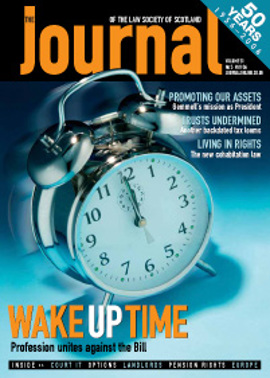Still a profession

Is it pure coincidence or the hand of fate at work that Ruthven Gemmell takes over the presidency of the Society this month? Despite a background in asset management at an Edinburgh private client firm, Ruthven is actually very well placed to advise on the effects of the Executive’s bill reforming the complaints system.
“The model for the proposals is the financial services industry and I’ve been involved in regulation there for a long time”, he explains, as he steps down from chairing the FSA’s Smaller Businesses Practitioners Panel just in time to take up the presidency. “There are an awful lot of similarities between that model and what’s being proposed for the legal profession.”
Ruthven however feels very strongly that the legal profession, with its history and developed set of ethics and standards, is much more of a definable entity than the financial services industry. “One really gets to the question of what is a profession, and I think a profession is a body that deals with admission of people to the body, the education and training of those people, the setting of ethical and professional standards, and then ultimately expulsion from the profession if they don’t meet those standards.”
True parallels?
So are the two areas close enough to justify such borrowing? “I can see from a consumer point of view why they would like to have the Financial Ombudsman Service model because it is very consumer facing”, he responds, adding that this gives rise to reservations due to the very width of issues that practitioners may have to deal with. “The definition of a complaint for both is ‘any expression of dissatisfaction whether justified or not’. Now that’s very wide and could cover a minor irritation, so solicitors want the definition to be more specific.”
The hallmark of a profession applies particularly with issues of conduct, he believes. “I really do think that has to be visited upon professional people by their peers, people who know what it means to do something and it’s quite difficult to see how a body that’s going to be run by a majority of non-solicitors and probably staffed by a huge majority of non-solicitors could achieve that.”
Ruthven remains convinced that the solicitors’ profession will survive, even if it has to adapt to change and, in response, find different models of practice. The changes may affect different practitioners in different ways. Clients may, however, find themselves in a very different legal services market and Ruthven wants to ensure that the Society continues to represent its concerns about the potential impact of this on clients as well as on the profession.
But he echoes the fears of many as to the impact of the proposed new regime on the smaller practice. “The ones that are going to be most hit are the smaller ‘high street’ practices. Plus the fact that it may well lead to a lot of these services being parcelled up, ‘commoditised’ is the expression we hear all too often.” By that he means legal practices becoming vehicles for the delivery of a very specific service – property transactions or will writing, for example – and simply not taking on any work that doesn’t fit within the four corners of that type of business. “Unfortunately that leads to a very inflexible type of service – the client has to take the package on offer or, if they can, go elsewhere if they have other needs.”
Continuity at the top
Although private client work can be a world away from the issues faced by, say, a legal aid practice, Ruthven is keenly aware of the concerns of solicitors in such work, having taken part as Vice President in the major meetings with the Executive and the Scottish Legal Aid Board, and having also spent some time at the Board at the invitation of former chairman Jean Couper. “And I have some excellent colleagues both on and off Council who are particularly well versed and have offered me their help”.
He also emphasises his desire for continuity in policy from one President to the next, and with Dunfermline’s Caroline Flanagan as his Past President and Fraserburgh’s John Mackinnon as Vice President the voice of the high street practitioner is not likely to be overlooked. “It really is a team effort and even if the chairman of the team changes, the three goals that have been set down are communication, the independence of the profession, and access to justice. Communication’s obviously been wonderfully celebrated this year with the anniversary events for The Journal. We’ve also used the regulatory debate to try and reach out to the profession. It’s very difficult sometimes as a busy practitioner to find the time to sit down and appreciate the full impact of what’s happening at the moment. Like a lot of things in life it’s only when the consequences arrive on your doorstep that you realise what it means.”
In fact he recognises that many in the profession believe that less focus on dealing with service complaints will allow greater focus on other areas of the Society’s work such as the support services it provides for its members, through its law reform and professional practice teams, not to mention The Journal: “I think what we want to ensure is that the Society continues to improve its communication process with the profession, public and stakeholders and be as useful as we possibly can to all the different practitioners who make up the Society’s membership.”
Talking points
At the same time the President’s role itself is subtly changing as the chief executive takes on more of a public spokesman role for the Society – part of the drive for a more focused approach, highlighted in the March Journal. But Ruthven sees this as a sharing rather than a transfer of functions.
“The chief executive is a constant factor in the work of the Society whereas the office bearers change every year. Because of that it was felt that a principal spokesman should be someone who is more permanent rather than someone who moves on once his/her service is completed. But I don’t think he can answer all the questions; he’s not a working practitioner which the President usually is. I think there’s plenty of room for more than one spokesman. I think there are issues where it’s appropriate for the President to be the spokesman and issues where it’s appropriate for the chief executive to be spokesman, in addition to other Council members and experts who also comment.”
Clearly there will be no shortage of talking points in the coming year as the Legal Profession Bill goes through, with the added pressure for the Scottish Executive of the clock ticking down to the parliamentary election in May 2007 – a factor that makes the bill’s fate even more difficult to predict, says Ruthven. The Society’s aim remains “to make sure that it’s good legislation and that it really delivers a better service for clients and a fair system for solicitors”, but only time will tell whether the deadline results in a greater or lesser likelihood of achieving that.
Solicitors in an open market
Other issues lie ahead, of course, such as the opening up of the legal market to non-lawyer court practitioners and legal aid providers. Ruthven comments that while the Society is watching developments with interest, it is still unclear what standards will apply to such practitioners or whether they will end up much different from solicitors once qualification and other regulatory considerations are taken into account.
“I think what comes through the whole of the consultation that we’re having at the moment with the Scottish Executive is, yes fine, you can impose more restrictions on solicitors, but what do you get in return for those restrictions? In other words what does the badge of solicitor actually allow you to do?
“I suppose also if it became a cheaper, more acceptable way to deliver, say, estate agency to clients and they were quite willing to do it, perhaps solicitors might want to carry out that part of their business under that form of regulation, such as it is, rather than as solicitors.”
He also raises the lack of clarity as to the model actually being proposed when asked about the prospects for MDPs: how do you determine who regulates what aspect of such a practice? “No one has yet come up with a workable model that would meet the different compensation arrangements, ethical standards arrangements. You see the kind of mess almost that the ‘one regulator’ financial services industry’s getting into: it’s got directives coming from Europe, it’s got the FSA trying to bring in principles-based regulation, and yet it’s got hundreds of pages of rules and that just causes expense and confusion.”
Ironically, he adds, the model being adopted there is to try and make the industry more like a profession. “It’s quite interesting to think of something that isn’t a profession trying to become one, and yet we seem to have an element of the government trying to make ours less of a profession. There’s a sort of strange traffic there.”
Concluding, he poses the question, perhaps for our legislators, “Are the public any more dissatisfied with their solicitors than they are with their estate agents or anyone else? The profession is sound and it will go on in spite of the bill.”
In this issue
- Stand up to be counted
- A bill to divide us
- The pendulum swings
- The pendulum swings (1)
- Cohabitation: the new legal landscape
- The tax man cometh (again)
- The foreign legion
- Making IT happen
- Apportioning and sharing
- Property problems
- Still a profession
- Arguing over agreements
- Next generation law
- Lawyers in the transfer market
- Scottish Solicitors' Discipline Tribunal
- Landlords: setting the mark
- Website review
- Book reviews
- Purchase options in leases






